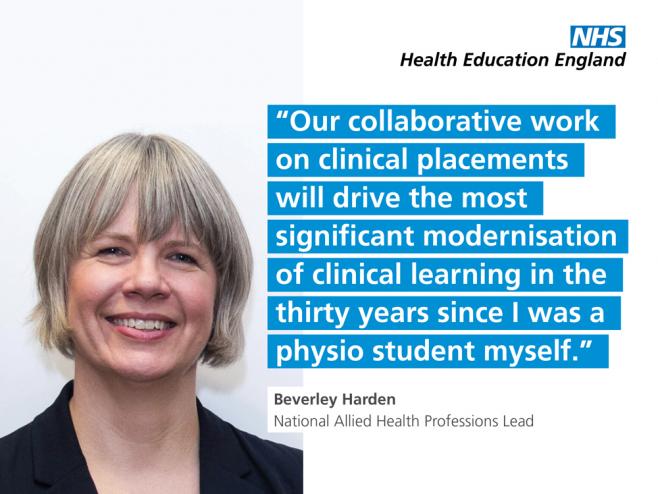You are here
Leading in partnership: training students in the pandemic
15 July 2020
 It's been a sobering few months on so many levels, yet it has been a time of seeing people flourish, adapt and lead in adversity.
It's been a sobering few months on so many levels, yet it has been a time of seeing people flourish, adapt and lead in adversity.
As the pandemic took hold, the enormity of the challenge of maintaining the clinical training of our thousands of allied health professions students escalated; we saw the level of risk increase, a reduction of services and more pressure for clinicians.
As the national lead for the education and training of the Allied Health Professions (AHP) workforce, Health Education England's role was to support the national pandemic student response.
I approached the Physiotherapy team at the University of Winchester* whose students would usually be placed in clinical settings, to ask if they would consider placing students in Health Education England as part of a leadership placement, as many clinical placements were unavailable. We discussed the transformational opportunity and built a shared aspiration that, together, we could drive uptake of resilient placements during the pandemic.
Novel placements like this still feel revolutionary; despite the requirement that the 21st-century health care workforce needs to excel in their clinical and academic studies but also learn about leadership, research and the wider context of public and population health.
In June we were joined by Charlotte Hobbs, a second-year physiotherapy student who agreed to join our social movement: she is driving our national crowdsourcing project, harvesting the wisdom of the AHP crowd with clinical and academic colleagues. This work will drive the most significant modernisation of clinical learning in the thirty years since I was a second-year physio student myself; it has resulted in extensive UK engagement across the 14 allied health professions, across all sectors.
In parallel to this, HEE is running a series of workshops built from the early learning from the crowdsourcing work showcasing the existing expansion of placements supported by and delivered using technology or simulation, multiple models of supervision and working through many of the other solutions suggested. This will drive innovation as well as support colleagues across England to creatively bid for the Health Education England placement accelerator fund. The collaboration across professions, universities, Royal Colleges, professional bodies, our regulators and internationally is quite fabulous to share learning and build ambition.
The energy and momentum from students, clinical teams and educators to courageously drive this innovation to support restart and growth is incredible to be part of.
Allied Health Professions are dietitians, occupational therapists, operating department practitioners, art therapists, drama therapists, music therapists, podiatrists, orthoptists, osteopaths, prosthetists and orthotics, paramedics, physiotherapists, diagnostic radiographers, therapeutic radiographers, speech and language therapists.
*Beverley Harden is Allied Health Professions Lead at Health Education England and a Visiting Professor at the University of Winchester.